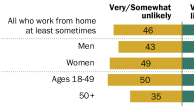by Richard C. Auxier
Seven Democratic candidates met on Soldier Field in Chicago on Tuesday to address a predominantly union audience at a candidate forum sponsored by the AFL-CIO. While membership in labor unions nationally has been declining in recent decades, nearly two-in-10 self-described Democrats (18%) live in households with a union member, according to a January poll by the Pew Research Center for the People & the Press.
Unions

Sen. Chris Dodd of Connecticut began debate by declaring, “I’m a union guy.” Throughout the debate the candidates competed with each other for the affections of the union crowd, running through their resumes to demonstrate their loyalty to organized labor. “In the last few years, 200 times I have walked picket lines,” said former North Carolina Sen. John Edwards. Democrats broadly support labor, according to the January Pew poll. Seven-in-10 Democrats (70%) have a favorable opinion of labor unions and 80% completely or mostly agree that labor unions are necessary to protect the working person. Republicans are split, with 48% having a favorable opinion of unions and 45% having an unfavorable opinion. Overall, 57% of the public has a favorable opinion of labor unions and 68% completely or mostly agree labor unions are necessary for workers’ protection.
Trade/ NAFTA

The presidential candidates – with the exception of Ohio Rep. Dennis Kucinich, who pledged to scrap NAFTA in his first week in office — tried to take a nuanced stance on free trade, an issue that was repeatedly addressed throughout the debate. “I believe in smart trade,” New York Sen. Hillary Clinton said. “Trade that has labor and environmental standards, that’s not a race to the bottom but tries to lift up not only American workers but also workers around the world.”
While a plurality of Democrats (42%) believe that free trade agreements such as NAFTA and the World Trade Organization have been a good thing for the U.S., a plurality (41%) also believes such trade agreements have hurt their personal financial situation. Overall, the general public believes that free trade has been good for the U.S. by 44% to 35%, but is evenly split on whether it has helped (35%) or hurt (36%) their personal financial situation.
“Hey, look, a president’s job is to create jobs, not to export jobs, and the idea that we are not willing to take the prime minister of Canada and the president of Mexico to the mat to make this agreement work is just a lack of presidential leadership,” said Sen. Joe Biden of Delaware, touching on a major concern of the public. Democrats (51% to 10%) and the general public (48% to 12%) agree that free trade agreements lead to job losses rather than the creation of jobs in the U.S.
Health Care
One of the most dramatic moments of the debate may have come not from the candidates, but from Steve Skvara, a retired steel worker who said he is no longer able to afford his wife’s health insurance. Skvara is not alone. The January Pew poll found that 26% of Americans reported that there had been a time in the past 12 months when they were unable to afford necessary health care for themselves or a family member. In making a decision about which candidate to support, health care is seen as a “very important” issue by 84% of Democrats in a June Pew survey. By comparison, 70% of independents and 54% of Republicans list health care as a very important issue when deciding which candidate to support.
[W]
Who’s Working for You?

The candidates sparred over the issues of lobbyists’ influence in Washington, and who would work hardest for the “average” American. “You’ve got to have a president in the White House who is not subject simply to the whims of corporate lobbyists,” said Illinois Sen. Barack Obama early in the debate. In a January Pew poll, Democrats (44%) were more likely than Republicans (28%) or independents (35%) to say that reducing the influence of lobbyists and special interest groups in Washington was a top priority. Edwards would later sound a similar message when he said, “And we’re going to stand up to give the power in America back to you and back to all Americans who deserve it by saying no forever to lobbyist money in Washington, D.C.” Democrats are less likely than Republicans to say that the government is run for the benefit of all the people (39% to 61%). Clinton, who faced criticism from Obama and Edwards on lobbyist influence, defended herself by saying her record of fighting interest groups and “standing up and fighting for people really speak for itself.” Democrats are less likely than Republicans to say most elected officials “care what people like me think” (33% vs. 42%).
Immigration

Obama was asked by Jorge Mulasano, who recently became a U.S. citizen, if he would in the future create a “path to citizenship” for undocumented workers. Obama replied that we can “be a nation of laws and a nation of immigrants,” calling for more border security. “But we also have to make sure that employers are held accountable, because right now employers are taking advantage of undocumented workers,” Obama said.A Pew survey in June found that 57% of Democrats listed increasing penalties on employers who hire illegal immigrants as the most effective way to reduce the number of illegal immigrants entering the country, placing it well ahead of proposals to increase the number of border patrol agents and build more fences. A majority of independents (55%) and about half of all Republicans (52%) also believed penalizing employers who hire illegal immigrants is the most effective way to reduce the number of illegal immigrants.
China
All the candidates were asked whether they see China as an ally or an adversary. Most candidates settled on describing China as a “competitor.” “It’s getting close to adversary,” said Dodd, who had some of the tougher language on China. “Let’s not have any illusions here.” A plurality of Democrats and the general public (47% respectively) believe that China’s emergence as a world power is a major threat. Republicans (51%) are slightly more likely to list China’s emergence as a major threat.




